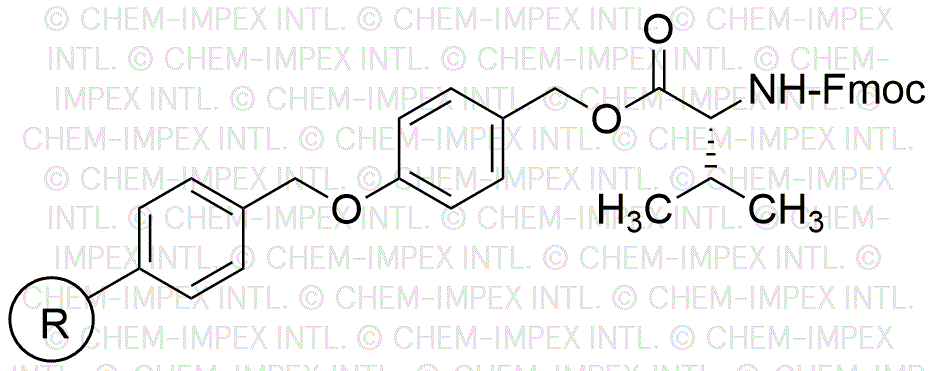Fmoc-D-valine 4-alkoxybenzyl alcohol resin is widely utilized in research focused on:
- Peptide Synthesis: This resin serves as a solid support for the synthesis of peptides, allowing for efficient coupling of amino acids and facilitating the production of complex peptide sequences.
- Drug Development: In pharmaceutical research, it is used to create peptide-based drugs, which can lead to more targeted therapies with fewer side effects compared to traditional small-molecule drugs.
- Bioconjugation: The resin can be employed in bioconjugation processes, where peptides are linked to other biomolecules, enhancing the specificity and efficacy of drug delivery systems.
- Research in Cancer Therapeutics: It is particularly valuable in developing peptide-based agents for cancer treatment, offering a pathway to innovative therapies that can selectively target cancer cells.
- Custom Peptide Libraries: Researchers utilize this resin to create diverse peptide libraries for screening potential drug candidates, accelerating the discovery of new therapeutic agents.
Informations générales
Propriétés
Sécurité et réglementation
Applications
Fmoc-D-valine 4-alkoxybenzyl alcohol resin is widely utilized in research focused on:
- Peptide Synthesis: This resin serves as a solid support for the synthesis of peptides, allowing for efficient coupling of amino acids and facilitating the production of complex peptide sequences.
- Drug Development: In pharmaceutical research, it is used to create peptide-based drugs, which can lead to more targeted therapies with fewer side effects compared to traditional small-molecule drugs.
- Bioconjugation: The resin can be employed in bioconjugation processes, where peptides are linked to other biomolecules, enhancing the specificity and efficacy of drug delivery systems.
- Research in Cancer Therapeutics: It is particularly valuable in developing peptide-based agents for cancer treatment, offering a pathway to innovative therapies that can selectively target cancer cells.
- Custom Peptide Libraries: Researchers utilize this resin to create diverse peptide libraries for screening potential drug candidates, accelerating the discovery of new therapeutic agents.
Documents
Fiches de données de sécurité (FDS)
La FDS fournit des informations de sécurité complètes sur la manipulation, le stockage et l’élimination du produit.
Spécifications du produit (PS)
Le PS fournit une description complète des propriétés du produit, notamment sa composition chimique, son état physique, sa pureté et les exigences de stockage. Il détaille également les plages de qualité acceptables et les applications prévues du produit.
Certificats d'analyse (COA)
Recherchez des certificats d'analyse (COA) en saisissant le numéro de lot du produit. Les numéros de lot et de lot se trouvent sur l'étiquette d'un produit, après les mots « Lot » ou « Lot de fabrication ».
Numéro de catalogue
Numéro de lot/série
Certificats d'origine (COO)
Ce certificat d'exploitation confirme le pays dans lequel le produit a été fabriqué, et détaille également les matériaux et composants utilisés et s'il est issu de sources naturelles, synthétiques ou autres sources spécifiques. Ce certificat peut être requis pour les douanes, le commerce et la conformité réglementaire.
Numéro de catalogue
Numéro de lot/série
Fiches de données de sécurité (FDS)
La FDS fournit des informations de sécurité complètes sur la manipulation, le stockage et l’élimination du produit.
DownloadSpécifications du produit (PS)
Le PS fournit une description complète des propriétés du produit, notamment sa composition chimique, son état physique, sa pureté et les exigences de stockage. Il détaille également les plages de qualité acceptables et les applications prévues du produit.
DownloadCertificats d'analyse (COA)
Recherchez des certificats d'analyse (COA) en saisissant le numéro de lot du produit. Les numéros de lot et de lot se trouvent sur l'étiquette d'un produit, après les mots « Lot » ou « Lot de fabrication ».
Numéro de catalogue
Numéro de lot/série
Certificats d'origine (COO)
Ce certificat d'exploitation confirme le pays dans lequel le produit a été fabriqué, et détaille également les matériaux et composants utilisés et s'il est issu de sources naturelles, synthétiques ou autres sources spécifiques. Ce certificat peut être requis pour les douanes, le commerce et la conformité réglementaire.

